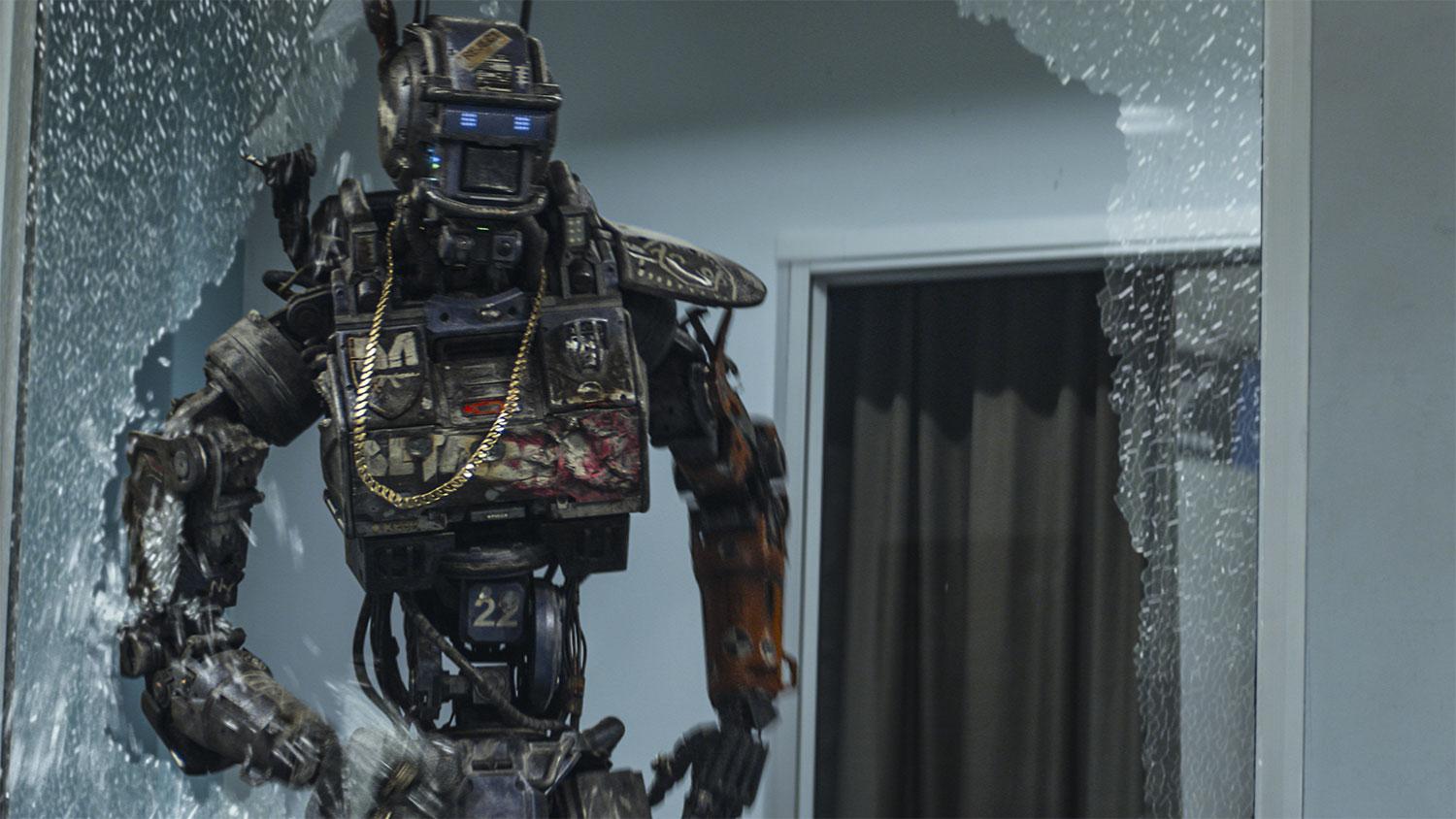“I am consciousness. I am alive.”
So says Chappie, a newborn police-bot that’s part RoboCop, part Pinocchio, and so many parts Sharlto Copley. Perhaps he’s right. But as a movie, Chappie is only barely alive. Director Neill Blomkamp’s third feature film once again sees him exploring a not-too-distant future Johannesburg, this time populated by law-upholding robot cops instead of disenfranchised aliens — but beyond similar surface details, Chappie has much less in common with District 9 than it does with Elysium.
In other words, it’s a mess.

Unfortunately for Deon, fate has other plans: Ninja and Yolandi, fictional versions of the Die Antwoord hip-hop artists of the same name, are in a bit of a bind after a deal goes south with a deadly crime boss. They have one week to cough up millions of dollars, or else they can kiss their pasty white behinds goodbye. With the help of their partner Yankie (The Walking Dead‘s Jose Pablo Cantillo), they come up with the idea of kidnapping Deon and forcing him to create their own personal robot army to solve all their problems.

Deon, Ninja, Yolandi, and Yankie are all in for a rude awakening when their paths collide, leading to the creation of Chappie: The first-ever robot cop with the ability to feel and evolve. Voiced by Blomkamp veteran Sharlto Copley, Chappie becomes the adopted son of Ninja and Yolandi, referring to the florescent felons as “daddy” and “mommy,” with Yankie serving as his cool uncle. They teach him how to be a gangster, how to use weapons, how to stand up for himself — all in the hopes of eventually stealing enough money to get the target off of Ninja and Yolandi’s backs.
But everyone has different ideas about Chappie’s well-being. Deon wants his invention to realize his full potential, and to stay as far away from these thugs as humanly (or inhumanly, as the case may be) possible. Ninja and Yankie want to turn Chappie into the baddest mother-you-know-what they possibly can. Yolandi wants Chappie to lead an innocent life, treating him like the child she never had. And when Vincent finds out about Chappie, all he wants is to destroy the damn thing, and the rest of Deon’s robot police, in order to pave the way for his own self-serving scheme.
In other words, there’s a lot going on — and with all the competing interests, not a whole lot of room for Chappie to find himself.
In other words, there’s a lot going on — and with all the competing interests, not a whole lot of room for Chappie to find himself. The most interesting character in the room, at least on paper, Chappie serves as little more than the shiny new toy that every kid in the playpen wants to take for a spin. Design-wise, he’s fantastic, with eyes that rival WALL-E in their expressiveness, perfectly paired with Copley’s portrayal of childlike wonder. But Chappie’s hopes and fears are lost in the collective shadow of so many conflicting stories, not a one of them compelling enough to warrant their prominence.
Like Chappie himself, Blomkamp seems pulled in so many different directions that he can’t find his true north. The central theme of the movie becomes impossible to define, given everything in play. Are we discussing the dangers of technology? Our own fleeting sense of mortality? The argument between nature versus nurture? Who and what are we rooting for here, other than for Chappie to flip the bird at every single character in the movie and go wander off on his own path? There are no clear answers, and there’s no clear sense that Blomkamp is even asking the questions so much as throwing notions at the wall and not bothering to see what sticks; he’s too busy shooting down the walls with all the gunfire at his disposal.

Blomkamp said something in a recent interview that’s gained quite a bit of attention lately. When asked about his feelings on Elysium, Blomkamp admitted that he “fucked up” the movie, saying, “The problem with me is I get so caught up in concepts and ideas. … I’m not like a normal person in the sense that I have to have a story for something to be interesting. Concepts are just as interesting to me as stories are.”
There’s a reason why Blomkamp’s self-diagnosis is getting tossed around as critics and moviegoers are finally getting the chance to talk about Chappie. His fatal flaw is front and center in the film. Chappie boasts a very cool concept about a self-aware machine springing to life with conflicting world views, but no story to back it all up. It’s like driving a shiny new sports car off the side of a cliff: a gorgeous ride, sure, but gorgeous doesn’t mean the damn thing can fly.
Copley’s performance, some admittedly fun (if bizarre) antics from Die Antwoord, and Blomkamp’s terrific design sense prevent Chappie from sharing Elysium‘s fate as a complete and utter failure. It’s not a good movie, but it’s not the worst in Blomkamp’s catalogue. Still, we expected better from the man who brought us District 9. Now, unfortunately, we know better.
Chappie is in theaters now.







